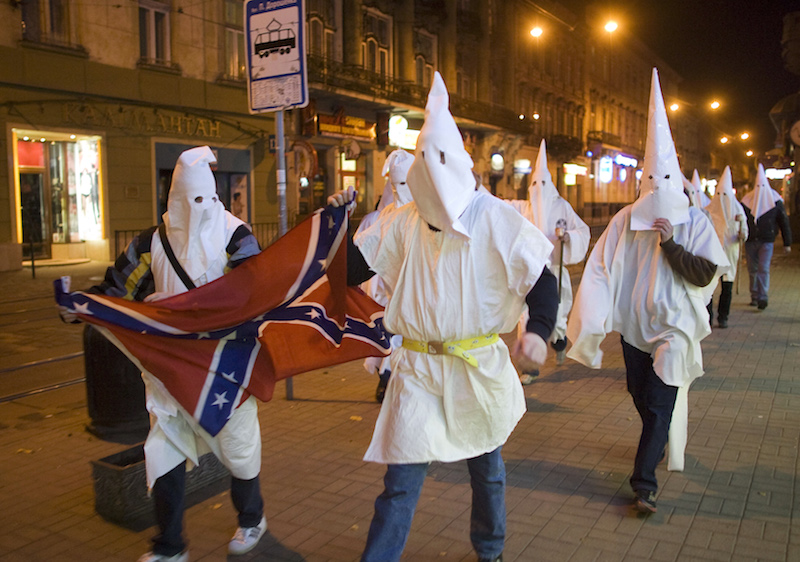
Supporters dressed as members of the Ku Klux Klan, using the occasion of Halloween to mask their faces from the police, express anti-Semitic views in Lviv on October 31, 2009. Photo courtesy of REUTERS/Vasily Fedosenko
ATLANTA (Reuters) A Georgia appeals court heard arguments on Thursday (July 9) but did not issue an immediate ruling in a Ku Klux Klan chapter’s lawsuit against the state for refusing the white supremacist group’s application to “adopt” a stretch of highway.
The KKK chapter, backed by the American Civil Liberties Union, sued Georgia in 2012 after it refused to let it join the state’s adopt-a-highway program, which involves volunteers picking up trash and planting trees along designated sections of roadway. Logos of participating groups appear on signs along the highways.
Georgia officials had told the International Keystone Knights of the Ku Klux Klan Inc that erecting a sign with its name could lead to social unrest and distract drivers.
The right to control the content of road signs is “government speech” which is not covered by the First Amendment, Brittany Bolton, an attorney for the state, told the appellate judges on Thursday.
Motorists viewing a road sign with a Klan logo “would have no doubt about who the speaker is and that is the state,” Bolton said.
The appeals court is hearing the case at a time of soul-searching across the U.S. South about race relations. Lawmakers in neighboring South Carolina voted on Thursday to remove the Confederate battle flag from the statehouse grounds, a longstanding demand of those who see it as a racist symbol.
The issue was resurrected after the massacre of nine African Americans at a Charleston church. The white man charged with the murders had photographed himself posing with the flag on a website featuring a racist diatribe.
Bolton compared the Klan case to a recent U.S. Supreme Court ruling that Texas has the right to reject a proposed specialty vehicle license plate displaying the Confederate battle flag.
But Alan Begner, attorney for the Klan, argued that Georgia’s constitution has stronger free-speech protections than the U.S. Constitution.
Begner also rejected Georgia’s claim that the Klan case should be dismissed because the state is protected by sovereign immunity, which bars governments from lawsuits on certain issues. Sovereign immunity does not apply to constitutional issues like free speech, Begner said.
A county judge last year refused a motion to dismiss the lawsuit and the state appealed to the Georgia Court of Appeals.
In 1997, Missouri rejected a similar request from a Klan chapter on the grounds that the group’s membership rules discriminated against non-whites.
A federal appeals court ruled that requiring such a group to alter its membership requirements to qualify for the adopt-a-highway program would “censor its message and inhibit its constitutionally protected conduct.”
(Reporting by David Beasley.)




